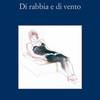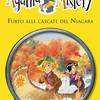Quasi quasi m'innamoro: Chick Lit Torinese
The debut novel by acclaimed television screenwriter Anne Mittone.
Anna Mittone (b. 1971, Torino) is an accomplished television screenwriter and author of contemporary women's fiction. She has written for some of Italy’s most beloved TV shows, including “Un medico in famiglia,” “Elisa di Rivombrosa” and “Un posto al sole,” and her debut novel, Quasi quasi m'innamoro (I Might Just Fall In Love) (Piemme, 2012), has drawn comparisons to the work of chick lit great Helen Fielding. In fact, the novel’s non-serenely named protagonist, Consolata Bogetto, has been called “the Bridget Jones of Torino.”
Like Bridget, Consolata is single, thirty-something, less than stimulated by her job and supported in her crises by a cast of misfit friends. But in contrast with her British counterpart, Consolata has an Italian-style dysfunctional family, and distinctly so. And when her heart is broken—by her ex-live-in companion who left her the year before after announcing that he’d gotten another woman pregnant—our fictitious heroine doesn’t go after a barrister like Mark Darcy. Oh no. She sets her sights on real-life singer, musician and X Factor judge Marco Castoldi, who goes by the stage name Morgan. Talk about a plot twist.
The language of Quasi quasi m’innamoro is as engaging and entertaining as the plot. The slang, Anglicisms, word play and cultural references, just to name a few, add personality and depth to the novel, as does the stream-of-consciousness narrative style. The novel also contains Piedmontese dialect and regionalisms, which localize the text and provide fascinating splashes of Turinese color.
REGIONAL ITALIAN of PIEDMONT
balengo (Ital. scemo; Eng. fool)
Mia sorella in stile tardo velina è accanto al balengo in pantalone di velluto viola e maglioncino a V pervinca ton sur ton e in tono con la moglie.
(My sister in late TV showgirl–style is next to the fool in violet velour pants and a periwinkle V-neck sweater ton sur ton and in tone with his wife.)
PIEDMONTESE DIALECT
It ses fola (Ital. Tu sei matta; Eng. You are crazy [to a female])
“It ses fola?” mi chiede mio padre.
(“Are you crazy?” my father asks me.)
SLANG
sbolognarla (Eng. to unload her; derived from the name of the city of Bologna, which was once known for producing cheap items)
…“Non devi rovinare la tua vita per me” un estremo tentativo di sbolognarla con onore, mascherando di cavalleria un attacco di panico.
(…“You don’t have to ruin your life for me” an extreme attempt to unload her with honor, masking with chivalry an attack of panic.)
vampirizza (Eng. literally, vampirizes, as in to suck the life blood out of)
…mia madre vampirizza ogni pallido tentativo di comunicazione esultando che Non è una notizia meravigliosa io me lo sentiva che c’era qualcosa nell’aria già dalla cena di Natale…
(…my mother sucks the life blood out of every weak attempt at communication by exclaiming It isn’t wonderful news I already knew that something was going on ever since Christmas dinner…)
HYPHENATION
felicità-fedeltà-organizzazione-tenuta (Eng. happiness-fidelity-organization-capacity)
Dopo solo tre mesi di Situazione sentimentale: fidanzato ufficialmente già si comporta come un maturo padre di famiglia, elargisce a chiunque, clienti compresi, massime di navigata saggezza su felicità-fedeltà-organizzazione-tenuta di una coppia…
(After only three months of Sentimental Situation: officially engaged is already behaving like a mature family man, bestowing freely upon anyone, clients included, principles of experienced wisdom about happiness-fidelity-organization-capacity of a couple…)
WORD PLAY
gayezza (Eng. gayness or gayity; a play on the Italian giaezza [Eng. gaiety])
Perché nonostante la sua per me lampante gayezza, Maurizio allude. Infarcisce di sottotesti. Lascia intendere che la notte è piccola per noi…
(Because notwithstanding his, for me, shining gayness, Maurizio alludes. He stuffs with subtexts. He makes it understood that the night is young for us…)
ANGLICISMS
happy end (Ital. lieto fine; Eng. happy ending)
E soprattutto mi fermo prudenzialmente sulla sottile linea rossa dell’happy end.
(And above all I stop prudentially on the subtle red line of the happy ending.)
APPROXIMATION
Bolscioi (Eng. Bolshoi)
Fare la commessa in un ipermercato dell’editoria è sempre stato il mio sogno. Appena un gradino sotto quello di cantare alla Scala, ballare al Bolscioi e declamare Racine alla Comédie Française.
(Being a clerk at a bookstore hypermarket has always been my dream. Just a step below that of singing at La Scala, dancing at the Bolshoi and reciting Racine at the Comédie-Française.)
ONOMATOPOEIA
etciù (Eng. ah-choo, the sound of a sneeze)
Uno per tutti tutti per uno, ma io mi sono quasi presa una polmonite per lasciare che tu e il balengo andaste a fondo nel vostro rapporto, nemmeno so cosa vi siete detti, né lo voglio sapere puoi restare qui tutto il tempo che vuoi ma io con mamma non ci parlo e siccome mamma sa che sei qui e non è stupida tra un’ora te la trovi al portone e io non voglio esserci. Etciù.
(One for all all for one, but I almost got pneumonia to let you and the fool get to the bottom of your relationship, I don’t even know what you said to each other, nor do I want to know you can stay here as long as you want but I’m not talking to Mom and since Mom knows that you here and she’s not stupid within an hour you’re going to find her at the door and I don’t want to be here. Ah-choo.)
FOREIGN ACCENT
gelato flitto (Chinese pronunciation of the Ital. gelato fritto; Eng. flied ice cleam)
Se adesso ci butto sopra un Crederci sempre arrendersi mai sono sicura che si alza e se ne va senza aspettare il gelato flitto che è poi l’unica ragione per cui si ostina a frequentare i ristoranti cinesi.
(If now I throw out an Always believe never give up I’m sure that he’ll stand up and leave without waiting for the flied ice cleam which is really the only reason he insists on frequenting Chinese restaurants.)
BEST MOVIE REFERENCE
Francamente mi cara me ne infischio (Eng. Frankly my dear I don’t give a damn)
…la nebbia mi avvolge come Rossella O’Hara dopo la morte di Melania, anche se dubito fortemente lei portasse sandali a listino color argento tacco dodici e comunque spero vivamente che Morgan non se ne esca con un Francamente mia cara me ne infischio perché francamente ne morirei.
(…the fog envelops me like Scarlett O’Hara after the death of Melanie, even though I seriously doubt that she was wearing discount silver-colored five-inch sandals, and anyway I fervently hope that Morgan doesn’t come out with a Frankly my dear I don’t give a damn because frankly I would die.)
Concluding Remarks: Quasi quasi m’innamoro is one of the best works of contemporary women’s fiction I’ve read. Mittone has an exceptional gift for putting the reader into Consolata’s head and Consolata into the reader’s heart. Along with Consolata, you’ll laugh (a lot), you’ll cry, you’ll fall down (and often, because her feet are too small for her body), you’ll pick yourself up—all the way to the thrilling-touching-inspiring “happy end.”
Note: Anna Mittone just released a new novel entitled Come ti vorrei (How I Would Like You) (Piemme, 2013). Although it doesn’t feature the regional language of Quasi quasi m’innamoro, it does involve a girls’ trip to Amsterdam and a reunion with an old flame. So, you know it’s good.
In Translation: The English translation rights to Quasi quasi m’innamoro are currently available. For the sake of English-speaking readers, I hope a translation is in the works soon. Because even though Consolata is from Turin, she’s in all of us. And she’s a symbol of hope.
On the Internet: For more information about Anna Mittone, check out her website and Facebook page. Also, watch for my upcoming interview with Mittone. In the meantime, check out the book trailer for Quasi quasi m’innamoro.





































i-Italy
Facebook
Google+
This work may not be reproduced, in whole or in part, without prior written permission.
Questo lavoro non può essere riprodotto, in tutto o in parte, senza permesso scritto.